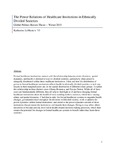| dc.rights.license | In Copyright | en_US |
| dc.creator | LeMasters, Katherine H. (Kate) | |
| dc.date.accessioned | 2015-07-29T20:06:29Z | |
| dc.date.available | 2015-07-29T20:06:29Z | |
| dc.date.created | 2015 | |
| dc.identifier | WLURG38_LeMasters_ECON_2015 | |
| dc.identifier.uri | http://hdl.handle.net/11021/32175 | |
| dc.description | Thesis; [FULL-TEXT FREELY AVAILABLE ONLINE] | en_US |
| dc.description | Katherine H. (Kate) LeMasters is a member of the Class of 2015 of Washington and Lee University. | en_US |
| dc.description.abstract | Formal healthcare institutions interact with the relationship between ethnic divisions, spatial
dynamics, and health in distinctive ways in divided societies, particularly when power is unequally distributed within these healthcare institutions. I thus ask how the distribution of power in formal healthcare institutions effects health in ethnically divided societies, which vary largely in their marginalization and in the spatial distribution of different ethnic groups. I explore this relationship in three distinct cases: Ghana, Romania, and Navajo Nation. While all of these cases are fundamentally different, they all help to shed light on if and how changing formal healthcare institutions alters the health of those residing in these societies, which have varying ethnic and spatial dynamics. I find that in order for formal healthcare systems to engender health changes, governments must recognize the divisions within their society, work to address the power dynamics within formal institutions, and attend to the power dynamics outside of these institutions that permeate the institutions and impede their changes. Doing so may allow ethnic minorities to become actively involved in health-related decision-making processes, which then creates the potential for changes in formal healthcare systems to benefit rather than harm these societies. | en_US |
| dc.description.statementofresponsibility | Katherine LeMasters | |
| dc.format.extent | 120 pages | en_US |
| dc.language.iso | en_US | en_US |
| dc.rights | This material is made available for use in research, teaching, and private study, pursuant to U.S. Copyright law. The user assumes full responsibility for any use of the materials, including but not limited to, infringement of copyright and publication rights of reproduced materials. Any materials used should be fully credited with the source. | en_US |
| dc.rights.uri | http://rightsstatements.org/vocab/InC/1.0/ | en_US |
| dc.subject.other | Washington and Lee University -- Honors in Politics | en_US |
| dc.title | The Power Relations of Healthcare Institutions in Ethnically Divided Societies (thesis) | en_US |
| dc.type | Text | en_US |
| dcterms.isPartOf | RG38 - Student Papers | |
| dc.rights.holder | LeMasters, Katherine H. (Kate) | |
| dc.subject.fast | Primary health care -- Government policy | en_US |
| dc.subject.fast | Equality | en_US |
| dc.subject.fast | Ethnic relations -- Political aspects | en_US |
| dc.subject.fast | Romania | en_US |
| dc.subject.fast | Ghana | en_US |
| dc.subject.fast | Navajo Indians | en_US |
| local.department | Politics | en_US |
| local.scholarshiptype | Honors Thesis | en_US |
